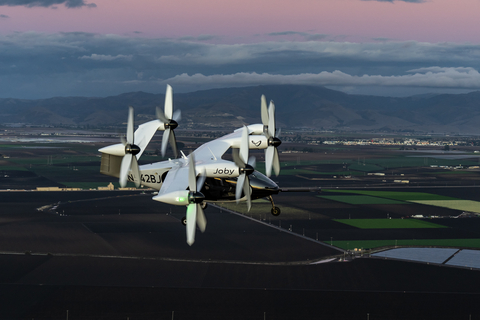Joby Receives FAA Approval for Propulsion Certification Plan
- FAA acceptance of propulsion certification plan marks critical step towards type certification
- All structural, mechanical, and electrical system certification plans now accepted by FAA
- Joby continues to demonstrate sector-leading progress on certifying its air taxi with the FAA

Joby’s all-electric aircraft in flight above
The propulsion system, designed by Joby, is central to the sector-leading performance of the Joby aircraft. The accepted certification plan includes Joby’s electric propulsion unit, propeller system, variable pitch actuation, coolant pump, nacelles, and associated electrical wiring, clearly defining the route to certifying these systems for use in commercial passenger operations.
“We now have an approved path across our certification program for all of the structural, mechanical, and electrical systems of our aircraft. This sets the stage for our team to execute against that path with a well-defined approach to for-credit testing and analysis as we continue to lead the industry towards certifying an electric air taxi with the FAA,” said Didier Papadopoulos, President of Aircraft OEM at Joby.
“I’m grateful to the incredible Joby team as well as the dedicated personnel at the FAA who continue to work hard to bring safety and innovation together, keeping
The FAA type certification process is a rigorous review of the design, manufacturing, and performance of a novel aircraft type, requiring the applicant company to demonstrate that every aspect of its aircraft meets applicable safety regulations.
With all but one certification plan accepted and the final document currently under FAA review, Joby is nearing completion of the third of five phases of the type certification process and has shifted its focus to the fourth stage, comprising detailed testing and analysis across the aircraft’s components and systems.
In 2023, Joby completed 30 for-credit tests with the FAA, covering a number of flight electronics units as well as structural materials. The testing methods and processes validated through these tests lay the foundation for the Company’s continued expansion of FAA for-credit testing.
Joby also recently received its Part 145 Maintenance Certificate from the FAA, allowing the Company to perform select maintenance activities on aircraft and marking another key step on the path to commercializing Joby’s electric air taxi service.
Joby’s electric air taxi is designed to carry a pilot and four passengers at speeds of up to 200 mph, offering high-speed mobility with a fraction of the noise produced by helicopters and zero operating emissions.
About Joby
Joby Aviation, Inc. (NYSE:JOBY) is a
Forward Looking Statements
This press release contains “forward-looking statements” within the meaning of the “safe harbor” provisions of the Private Securities Litigation Reform Act of 1995, including but not limited to, statements regarding the development and performance of our aircraft, our regulatory outlook, progress and timing; our business plan, objectives, goals and market opportunity. You can identify forward-looking statements by the fact that they do not relate strictly to historical or current facts. These statements may include words such as “anticipate”, “estimate”, “expect”, “project”, “plan”, “intend”, “believe”, “may”, “will”, “should”, “can have”, “likely” and other words and terms of similar meaning in connection with any discussion of the timing or nature of future operating or financial performance or other events. All forward looking statements are subject to risks and uncertainties that may cause actual results to differ materially, including: our ability to launch our aerial ridesharing service and the growth of the urban air mobility market generally; our ability to produce aircraft that meet our performance expectations in the volumes and on the timelines that we project, and our ability to launch our service; the competitive environment in which we operate; our future capital needs; our ability to adequately protect and enforce our intellectual property rights; our ability to effectively respond to evolving regulations and standards relating to our aircraft; our reliance on third-party suppliers and service partners; uncertainties related to our estimates of the size of the market for our service and future revenue opportunities; and other important factors discussed in the section titled “Risk Factors” in our Annual Report on Form 10-K, filed with the Securities and Exchange Commission (the “SEC”) on March 1, 2023, and in future filings and other reports we file with or furnish to the SEC. Any such forward-looking statements represent management’s estimates and beliefs as of the date of this presentation. While we may elect to update such forward-looking statements at some point in the future, we disclaim any obligation to do so, even if subsequent events cause our views to change.
View source version on businesswire.com: https://www.businesswire.com/news/home/20240209193688/en/
Joby Aviation
Investors:
investors@jobyaviation.com
Media:
press@jobyaviation.com
Source: Joby Aviation, Inc.







